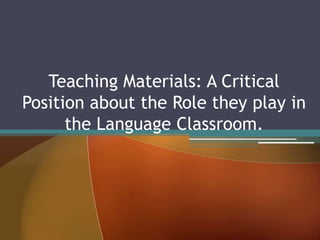Didactics presentation
- 1. Teaching Materials: A Critical Position about the Role they play in the Language Classroom.
- 2. Reflection:What do you think the role of schools in Colombia is? Is this the same all over the world?What is the role of teaching materials in foreign languages?Are Colombian EFL teachers preparing students for a global world?
- 3. IntroductionWhy is TEFL a difficult task?What is Language?: Part of society.Inputs, experiences, emotions, discourses to solve everyday problems.Way to position oneself in a world moved by unequal power relationships.Teaching-learning scenario: challenging.
- 4. To develop cultural and ideological awareness.
- 5. Role of language: critical understanding in politics, economics, individual differences, linguistic communities. Language Teaching-Learning and Teaching MaterialsTeaching materials:Help teachers and Ss. develop more critical thinking or to construct misconceptions.
- 6. Regulate the use and production of lang. in the educational processes.What does the development of curriculum depends on?Context, role of individuals, use of resources.
- 7. Pedagogical choices are Ideological in nature with significant implications for learners.Language planning is aimed at promoting critical thinking. How?Teachers must think about the implicit information and values Ss. are provided with to promote or create common sense assumptions.What is presented in the curriculum is the ultimate truth.Language functions should include a critical view of cultural practices, values and attitudes.
- 8. Teaching Materials: Conceptual Considerations.Krashen: They function as stimulus to promote learning.Tomlinson: they can be anything used to increase the learner’s knowledge and/or experience of the language.MartĂn: Vital resources that stimulate and develop students’ linguistic skills.Materials are meaningful constructions of reality and truth. They create mental images and representations of everything related knowledge.
- 9. TeachingMaterials and IdeologyMaterials are ideological contructions to deal with language matters and the world.Teaching materials can determine the perception of the world students and teachers build up in regards to linguistic and pragmatics. They are related to discourse and ideology.
- 10. Teaching Materials and Critical ThinkingCritical thinking refers to a whole pedagogy that empowers Ss to think and reason more carefully.Both, teachers and Ss can question the content of the materials and discern their implicit worldview.Both can criticize the social, political, economical and cultural discourses of the materials provided by official institutions.Materials should permit Ss to express diverse viewpoints respecting differences and see the implications.Materials can be means of “EMANCIPATION”
- 11. What Does This Have to Do with Colombia?
- 12. RememberingRecalling and recognizing previously learned material, such as a fact, a definition, or a theory. Key words: choose, find, define, label, spell, list, select, write, tell.Tell about the main character in the story? Where do people find her?
- 13. UnderstandingMaking sense of the material. This level goes beyond simple recall, and students might say, “Ah, now I get it!”
- 14. Key words: discuss, outline, explain, summarize, restate, describeDescribe in your own words the setting of the story.Explain what happened to La Llorona’s children?
- 15. ApplyingUsing learned material in new situations. Practice is essential at this level. Key words: apply, select, plan, solve, use, show, calculate, build, developWhen you were a child, how did you feel when you heard the story of La Llorona?What do you think parents should tell their children about La Llorona?
- 16. AnalyzingBreaking information into its various parts and examining the relationships of the parts to the whole.
- 17. Key words: distinguish, categorize, compare, contrast, examine, separate.
- 18. What lesson(s) should we learn from the La Llorona story?EvaluatingPresenting and defending opinions by making judgments about information based on a set of criteria.
- 19. Key words: assess, judge, decide, argue, debate, prove, support, defend, dispute.
- 20. What lessons do you think the story of La Llorona is supposed to teach children? CreatingTaking information and doing something completely different with it. Key words: imagine, compose, design, predict, combine, invent, propose, infer.Write the story as if La Llorona were living today.
- 21. Are our teaching materials developing critical thinkers?Are we assuming a critical position towards the curriculum, content and material previously given?Thanks……..















